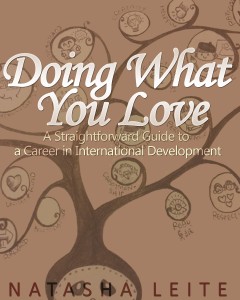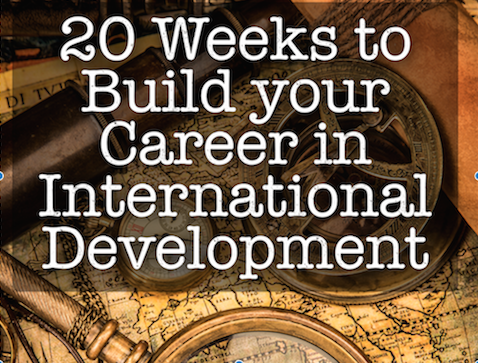
SEATTLE — Natasha Leite has nine years of experience working as a governance expert in Latin America, the Caribbean, Africa and Asia. She has recently written a book on development work called “Doing What You Love! A Straightforward Guide to a Career in International Development” that can be found here. You can also subscribe to her newsletter on development, follow her other articles or learn about a career in development or job opportunities on her Facebook page.
Here is my Q&A with Natasha Leite:
1. What does the “new generation of development professionals” look like?
This new generation of development professionals have probably grew up with the idea of development workers from the 90s and 00s… In a very romanticized way. Alongside the Generation Y high expectations for their (our) future came the idea that your work should also be meaningful and, for many, that translates into development work. They are also more educated and tech-savvy than the generation before… Because, well, we grew up with this technology and a market that demanded more qualification.
2. Why is there a divide between the two generations? What changes exist and why?
The main divide between the two generations is that previous development workers didn’t graduate in international development or have related MAs. They value much more practice-based education and work experience, which has led to a lot of activities that were implemented on a trial and error basis. In turn, this generation has focused on getting advanced degrees early. And even though we graduate much earlier, it’s easier for all this knowledge to become wasted if there is no relation with practice. Furthermore, having a bit of practical experience (if that is your goal) before going to graduate school can significantly alter your perspectives on work, on what do you want to focus in your degree and how to make the most out of that experience.
Also, there is a different profile… Before, most aid workers came from semi-diplomatic backgrounds (for headquarters) or field workers who were sort of a mix of misfits/adventurous/missionaries who were expecting to face a lot of hardships, but they would do it anyway. Not many protocols or standards of protection. Today, we have an array of intermediate positions and much more job security and professionalization of the area (which is a positive, in my opinion). People today are more entitled than before, when they knew that this would be a difficult process. Plus, today, there is a lot more ownership of local knowledge and local experts, so it is truly a global competition (which I also add to the good aspects).
3. What are various challenges that this generation faces? How and why are they different from those that previous generations faced?
This generation faces more competition for sure. Most professionals can find a related area of expertise in the nonprofit world. You can be a doctor for MSF or an engineer for UNICEF. However, social scientists and humanities students have to work double to establish themselves as viable and valuable candidates.
Also, there is a lot more being requested from entry-level workers than before. It’s not good enough to know English. You have to know English and another U.N. language, plus a local language if that language is not among big 6 (Arabic, English, French, Mandarin, Spanish and Russian). Plus, if you want to work abroad you must have some outside-country experience and related-experience, which usually is a tall order from someone who has just graduated at 21-22. So, I would start thinking local before going global.
The other good aspect from previous generations in that they had no rush to get where they got. They knew where they wanted to be, so they didn’t mind investing the time to get [there]. We grew up on a diet of instant gratification, so patience is something that many have to work on.
4. Why do you believe that investors should focus on this generation and the work they do?
I think investors should focus on great ideas, innovative solutions, ownership and prioritizing the views of local communities, supporting projects for longer periods of time (5 years, instead of the current year-funding madness)… Regardless of the generation it is coming from.
5. Why do you think it is important to change things on a global scale?
I think it is important to change things in a local scale globally, especially social injustice. If everybody had a chance of dignified living, our collective existence would improve greatly. We don’t live by ourselves. We share this world with a lot of people, most of whom don’t share our privileges and don’t have the access to the same opportunities.
I think it is part of our job – as development workers, but also as a society – to be more tolerant and supportive with one another. Yes, we have to support the development of individuals, but we also have to empower communities and encourage social cohesion in order to create peaceful coexistence and inclusive societies.
6. If you could invest a billion dollars in improving the world, how would you spend it?
Uff… That’s a difficult question. Twenty percent I would spend it in 5-year innovative peace projects that could chance their priorities according to evaluations and communities’ priorities.
Another 20 percent I would spend in girls’ education where the educational gap between boys and girls is more critical. Women are half of the world’s population, but in most countries their ability to transform and improve their communities is limited due to patriarchal values that lead us nowhere.
Definitely would invest in the other 20 percent in sexual and reproductive health rights. It’s been 20 years since the International Conference for Population Development and we have progressed. In many cases, it even seems like we are moving backwards. We desperately need family planning, sexual education, but also appropriate clinics and support for people who have been sexually assaulted in conflict and emergency scenarios.
Twenty percent I would spend on legal and psychosocial support for victims of human trafficking; it’s the fastest growing criminal trend and the actions being taken to curb come once again from a perspective of criminalizing the victims.
Last, but not least, I would invest my last 20 percent in restorative justice. Supporting our justice systems to become much more focused on what the victim needs to move on with her life than to focus on punishing the guilty and creating one more instrument of “social control” of the most underprivileged.
I chose those areas because I believe they have major repercussions on people’s lives. But also, because I believe they are the ones that create the least dependency. I also think that the existing investment on those areas is: a) very limited or b) very restrictive.
7. Further comments:
I think we have enhanced the quality of development work a lot. We pay more attention to the sustainability of our actions and their future consequences. The field is a lot more democratic and communities have a bigger role in the development of projects. It does make the process a little more burocractic, but there is also a lot more transparency and accountability.
This article was originally posted at Borgen Magazine.





